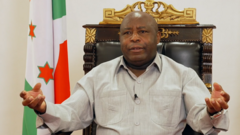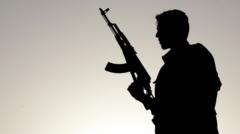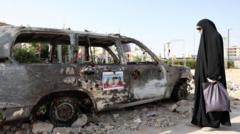Burundi’s President Évariste Ndayishimiye alleged in an interview that Rwanda plans to attack his nation. In response, Rwanda called the remarks surprising, emphasizing cooperation on security issues despite a year-long border closure. Both countries grapple with ongoing regional tensions amid unrest in the Democratic Republic of Congo.
Rwanda Denies Attack Plans Amid Rising Tensions with Burundi

Rwanda Denies Attack Plans Amid Rising Tensions with Burundi
Burundi's President claims credible threats from Rwanda while both nations aim for cooperation.
In a recent exclusive interview with the BBC, Burundi's President Évariste Ndayishimiye voiced serious concerns about potential aggression from neighboring Rwanda, asserting that he possesses "credible intelligence" supporting his claim. Ndayishimiye alleged that Rwanda has a historical pattern of interfering in Burundi's affairs, mentioning that a coup attempt a decade ago had roots in Rwandan actions, paralleling current conflicts in the Democratic Republic of Congo (DRC).
Rwanda's government swiftly dismissed the president's allegations as "surprising," insisting on their ongoing cooperation regarding security measures at the shared border, which has remained closed for over a year due to rising tensions. While Rwanda has consistently denied supporting the M23 rebel group in eastern DRC, evidence suggests otherwise, complicating the narrative surrounding its influence in regional conflicts.
Ndayishimiye claimed that Rwanda's support for a proxy group, the resurgent Red Tabara rebels, aims to destabilize Burundi. He asserted, "Burundians will not accept to be killed as Congolese are being killed. Burundian people are fighters." He emphasized his government's desire for dialog rather than warfare, urging for adherence to past peace agreements.
The political climate in Burundi is tightening amid fears of external aggression. The situation worsens with the DRC’s ongoing conflict, which has witnessed armed groups battling for control of its valuable mineral resources. Ndayishimiye criticized external forces for inciting turmoil in the DRC, asserting that peace hinges on collaborative dialogues among all stakeholders, including armed factions.
Refugees fleeing violence in the DRC face perilous conditions, with reports of many risking their lives crossing the hazardous Rusizi river into Burundi. While some evaded the dangers, many reported frustrations regarding humanitarian conditions and the closure of vital borders denying return to their homeland.
In terms of regional security, Ndayishimiye advocated for extending the mandate of international forces in the DRC to engage with rebels. He emphasized that Burundi's military presence in the DRC would continue until assurances of border safety are established. This call for action came after the withdrawal announcement of southern African forces aiding in combat against the M23, which has intensified fighting in the region.
As tensions escalate between Rwanda and Burundi amid ongoing violence in the DRC, the substantial international and local complexities will play a critical role in determining the future of regional stability and peace.
Rwanda's government swiftly dismissed the president's allegations as "surprising," insisting on their ongoing cooperation regarding security measures at the shared border, which has remained closed for over a year due to rising tensions. While Rwanda has consistently denied supporting the M23 rebel group in eastern DRC, evidence suggests otherwise, complicating the narrative surrounding its influence in regional conflicts.
Ndayishimiye claimed that Rwanda's support for a proxy group, the resurgent Red Tabara rebels, aims to destabilize Burundi. He asserted, "Burundians will not accept to be killed as Congolese are being killed. Burundian people are fighters." He emphasized his government's desire for dialog rather than warfare, urging for adherence to past peace agreements.
The political climate in Burundi is tightening amid fears of external aggression. The situation worsens with the DRC’s ongoing conflict, which has witnessed armed groups battling for control of its valuable mineral resources. Ndayishimiye criticized external forces for inciting turmoil in the DRC, asserting that peace hinges on collaborative dialogues among all stakeholders, including armed factions.
Refugees fleeing violence in the DRC face perilous conditions, with reports of many risking their lives crossing the hazardous Rusizi river into Burundi. While some evaded the dangers, many reported frustrations regarding humanitarian conditions and the closure of vital borders denying return to their homeland.
In terms of regional security, Ndayishimiye advocated for extending the mandate of international forces in the DRC to engage with rebels. He emphasized that Burundi's military presence in the DRC would continue until assurances of border safety are established. This call for action came after the withdrawal announcement of southern African forces aiding in combat against the M23, which has intensified fighting in the region.
As tensions escalate between Rwanda and Burundi amid ongoing violence in the DRC, the substantial international and local complexities will play a critical role in determining the future of regional stability and peace.






















